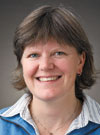Q&A: A broad vision for cross-college biology education
As one who balances scientific interests in microbes and climate change with a passion for human development, associate soil science professor Teri Balser knows a thing or two about bridging diverse disciplines and perspectives. Who better, then, to lead the Institute for Cross-College Biology Education (ICBE)? Created in 2004 to improve the teaching of biology — a subject that spans nearly every UW–Madison school and college — ICBE oversees courses and programs for thousands of undergraduates. Now as its new director, Balser hopes to see it grow.

Balser
Wisconsin Week: What attracted you to this position?
Teri Balser: I’ve always been fascinated by life sciences in general, not just by any particular branch of them. The research I do really spans a spectrum: It’s microbiology, physiology, ecology, ecosystems. I also think we have an amazing opportunity for biology education on this campus. So the ICBE struck me as having incredible potential to do something really innovative, to be a powerful model nationally. The position also dovetailed with work I’ve been doing almost since I arrived in faculty and graduate student development, and teaching and learning reform. So it just seemed like a great fit for me.
WW: Why does UW–Madison offer such opportunities in biology education?
TB: What’s unique about us is our breadth in the life sciences. We have a huge number of biology faculty, and that diversity of perspectives alone provides opportunity. Students can get a broader biology education here than almost anywhere else. So I’d like to see us take advantage of that.
At the same time, it can be bewildering from the outside; there’s just so much going on here. That’s why I hope to see ICBE become a portal to the biological sciences at UW–Madison. I’d love to have recognition not just on this campus, but also off-campus that ICBE is the “way in,” the way to make sense of our diversity.
WW: What is ICBE exactly?
TB: ICBE was created as an administrative umbrella with three main areas under it: CBE, the Center for Biology Education, the biology majors, and the cross-college biology courses and programs, such as Biocore and Biology 151/152. I think the idea was that because biology at UW Madison is so large and became a cross-college major, people thought, “What can we do to house this?” A College of Biology wasn’t feasible, so ICBE was developed.
WW: How do you see it evolving in the future?
TB: What I’d like to see ICBE become is a conceptual, intellectual and scholarly umbrella, as well. That is, it wouldn’t just be a place for undergraduate majors to find themselves, but also a community for faculty, staff and graduate students focused on cross-college biology education.
So that would mean potentially sponsoring a seminar series or teaching awards programs for graduate students or instructors. I’d also love to see us strengthen the things that CBE already does to promote undergraduate research, perhaps by creating an undergraduate biology research scholars program. Those are just examples of things ICBE could do to gain a sense of identity and better visibility on campus.
WW: What are some of your other goals?
TB: I’d like to see us place more emphasis on nonmajor education. That doesn’t mean everybody has to be a biologist or would want to be. But because of things like emerging infectious diseases, the spread of antibiotic resistance and bioenergy (I mean, it’s bioenergy, right?), some have argued that understanding biology is essential for people’s ability to vote, to understand public policies and so on. So, I’ve been thinking about the idea of “bio-literacy” and how to foster it.
WW: What will be your first step?
I’d also maybe like to host a symposium next year, where we’d bring in people who are doing innovative, interesting things in biology education at universities around the country of similar size. That might be a fun way to think creatively about where we want to go with biology education on this campus. What’s the next thing for us? How do we grow?
TB: All of this comes with the caveat that I have at least one semester, if not more, of getting to know everybody. We’ve got pockets of innovation all over campus, but because we’re so big, we don’t always know who’s doing what. So I want to spend a lot of time talking to students, faculty and staff about what’s working and what they think ICBE could be or should be. Nothing I’m envisioning is set in stone.
WW: Where does your enthusiasm for education come from, do you think?
TB: I think it’s something I just have. When I was little, I used to wander around outside, turning over rocks and grabbing the things that were running away. And I had to empty my pockets before my mom would let me into the house because I’d have little snakes and turtles, and who knows what else. So the interest in the natural sciences was always there, but then I also always wanted to tell people about it. I thought everything was really cool and I wanted to share that with people. Teaching is my way of sharing my enthusiasm.
WW: So if there were just one thing you could accomplish as director, what would it be?
TB: For me, it’s achieving a sense of community — the idea that anybody who has the slightest inkling they might be interested in biology education and is asking, “Where’s my community?” will know they can go to ICBE and find it. That’d be No. 1.
Tags: biosciences




